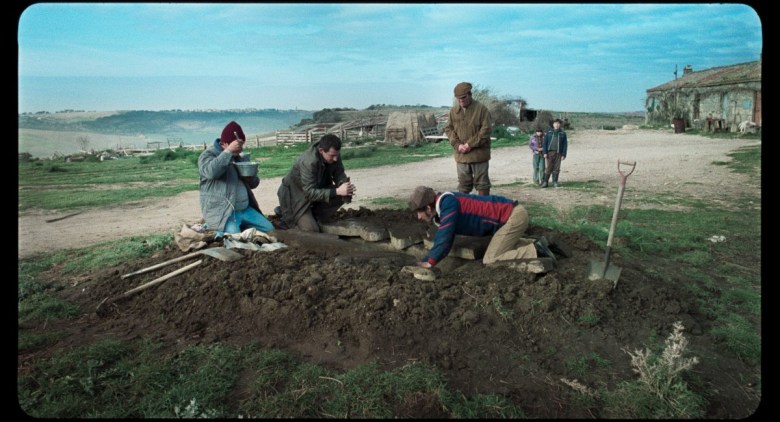Archaeology requires a considerable amount of patience. The days on a dig are long, the tasks arduous, and the results rarely illuminating. But thanks to Hollywood’s rebranding of the archaeologist as a Western hero, the image of a team tentatively uncovering buried items with delicate precision is not the one we are accustomed to. Because of Indiana Jones and those that followed in his stead — Lara Croft and the Ancient Egyptian scholars of The Mummy (1999), for instance — our image of archaeologists involves dodging booby traps, fighting henchmen, and escaping tombs with mystic artifacts in tow.
Indiana Jones, that dashing cowboy of the desert dig, coined the motto “It belongs in a museum,” but the sentiment rippled throughout the action films that followed, turning the colonizer’s theft into a fun adventure. Hollywood’s archeology genre has uplifted its protagonists into heroes that protect historical finds, ensuring that they find a new home in the clean, vapid spaces of the Western museum, locked forevermore inside a glass cabinet.
Alice Rohrwacher’s latest film, La chimera (2023), resists cinema’s compulsion to romanticize the Western archaeologist as more than a glorified graverobber. The question here, rather, is whether a general audience deserves the privilege to gaze upon artifacts at all. The disheveled protagonist, Arthur (Josh O’Connor), is a man at odds with himself — his love for archaeology has led him to the Tuscan countryside, where he has found himself in the black market of historical artifacts.
It’s worth noting that La chimera is not the first film to reckon with the museum complex as a problematic industry. In Black Panther (2018), N’Jadaka, also known as Erik “Killmonger” Stevens (Michael B. Jordan), questions the apparent expert of a West African exhibit, asking how she thinks the museum procured these artifacts in the first place, before stealing — or reclaiming, depending on whom you ask — them back. Killmonger may be the villain of that film, but his motives in that moment are more justified than any of the tomb raiders cinema has held up as the good guys.
Unlike the clear-cut definitions of hero and villain in the classic Tomb Raider movies, La chimera refuses to dabble in such categorical thinking. Instead, every person who has a hand in procuring and selling the goods is morally dubious, from the gang of lovable grave robbers who deceive land owners to try to get their share, to the auctioneer (Alba Rohrwacher) who sells each stolen piece to the highest bidder.
The turning point for Arthur is when a particularly spectacular discovery is thoughtlessly decapitated: His fellow grave robbers begin dismembering the statue in order to smuggle it out. From this moment on, he questions who has the right to possess and perceive this beautiful statue, which was created to preside over the souls of the dead. Later, the audience shares in Arthur’s dismay as we watch the now-headless statue stored in a crate unceremoniously filled with brightly colored soccer balls. The ancient object imbued with spiritual meaning deserved better than this prosaic fate.

You will never find Arthur carrying a whip or swapping out a golden statue for a sandbag of equal weight. (He does, however, have a mystic ability to find Etruscan tombs, which grants La chimera a magical realist quality.) But instead of using this skill to romanticize and justify the actions of the raiders, director Alice Rohrwarcher uses it as a vehicle to raise questions about who is entitled to the property of the dead.
Many of us, like Arthur, have found ourselves enchanted by the traditions, myths, and religions of ancient civilizations — the very reason why films centering the tomb raider and the supposed guardians of stolen goods have long held our attention. La chimera, on the other hand, is a movie for those whose young fascinations with history have since matured, and who now rightly question the ethics of museum acquisition. By offering the antithesis of everything Western cinema’s raiders epitomize, it sheds light on the nefarious trades that uphold the art industry, revealing the capitalist drive that leaves burial sites stripped bare.



La chimera, directed by Alice Rohrwacher, is currently screening at theaters across the United States. It was released in 2023 in France and Italy.

